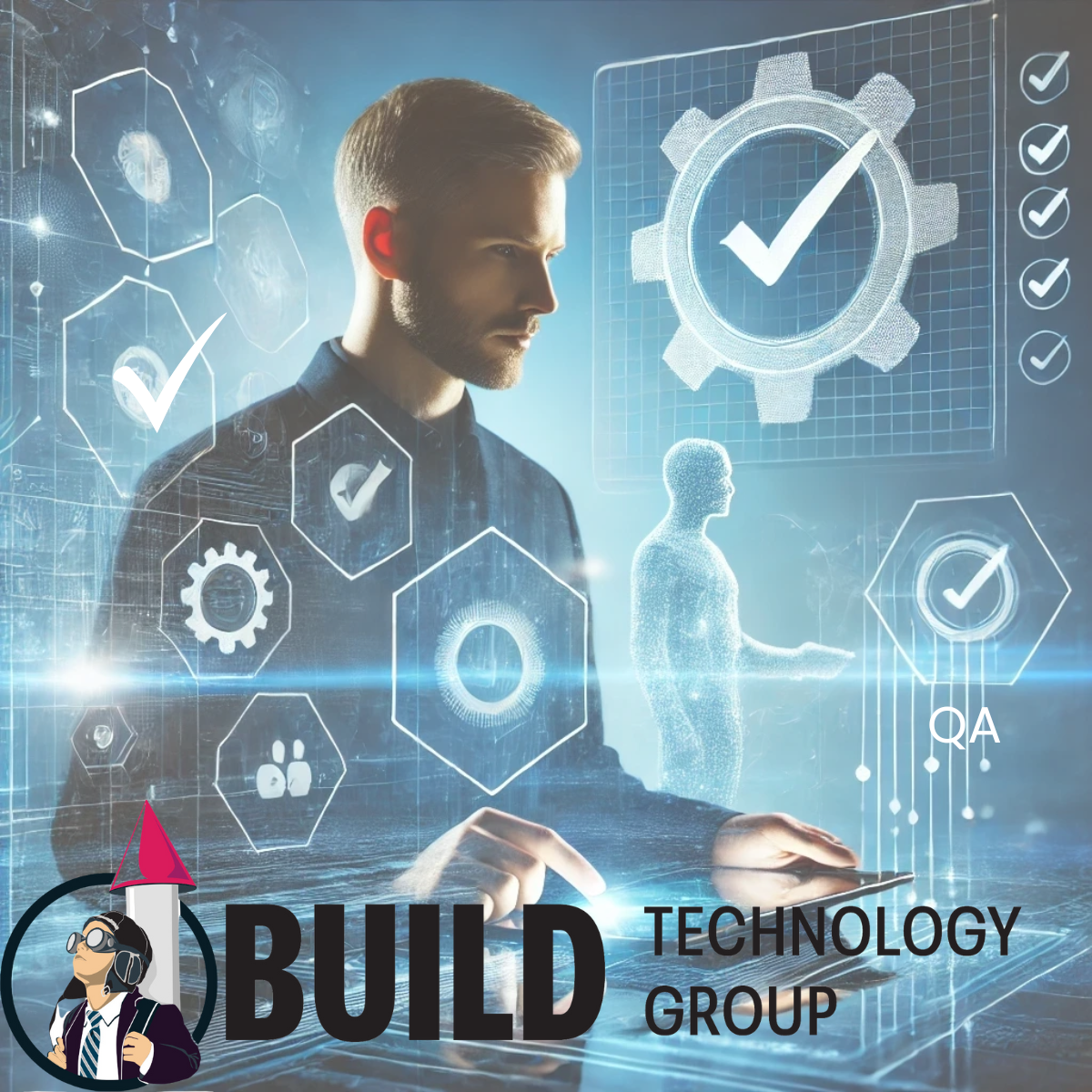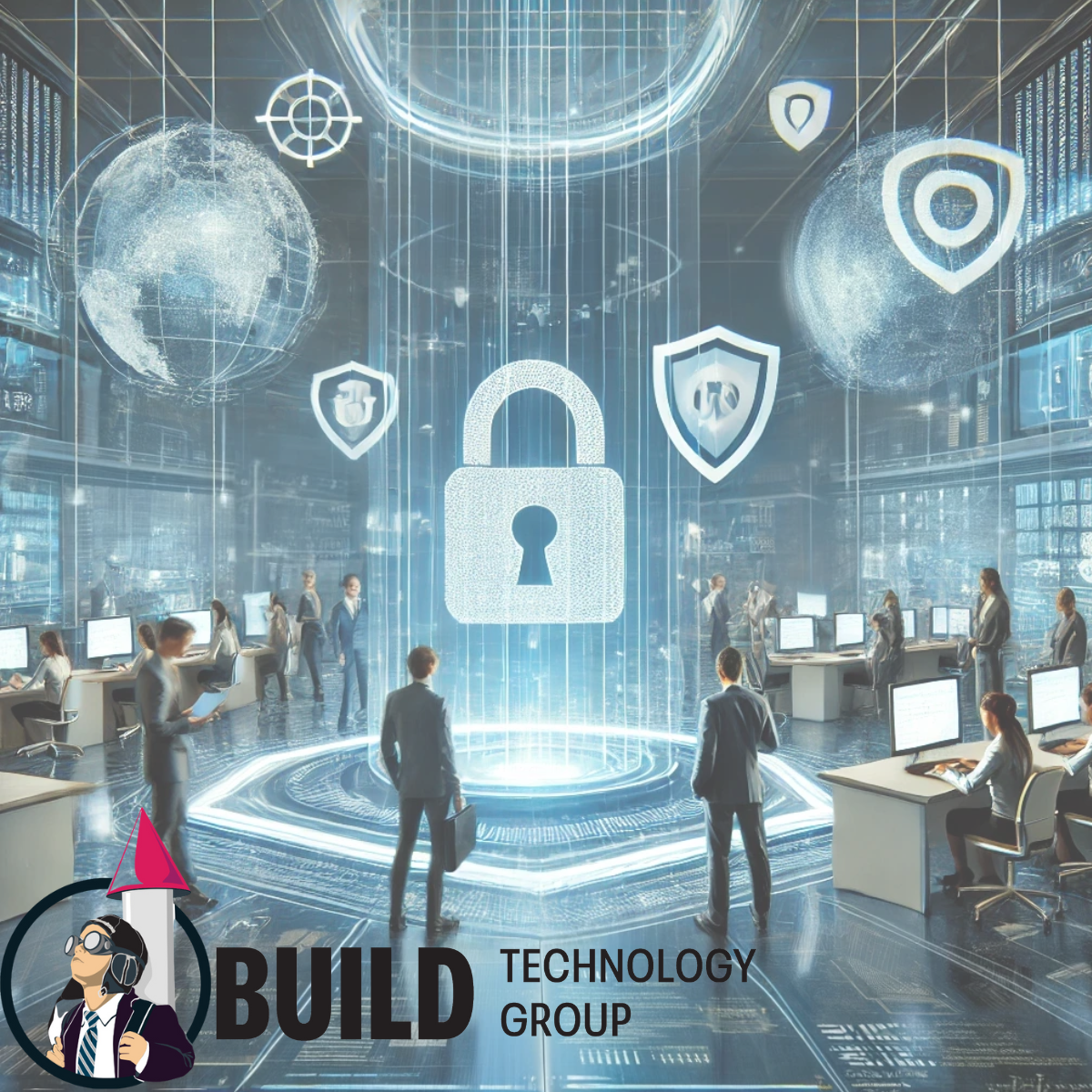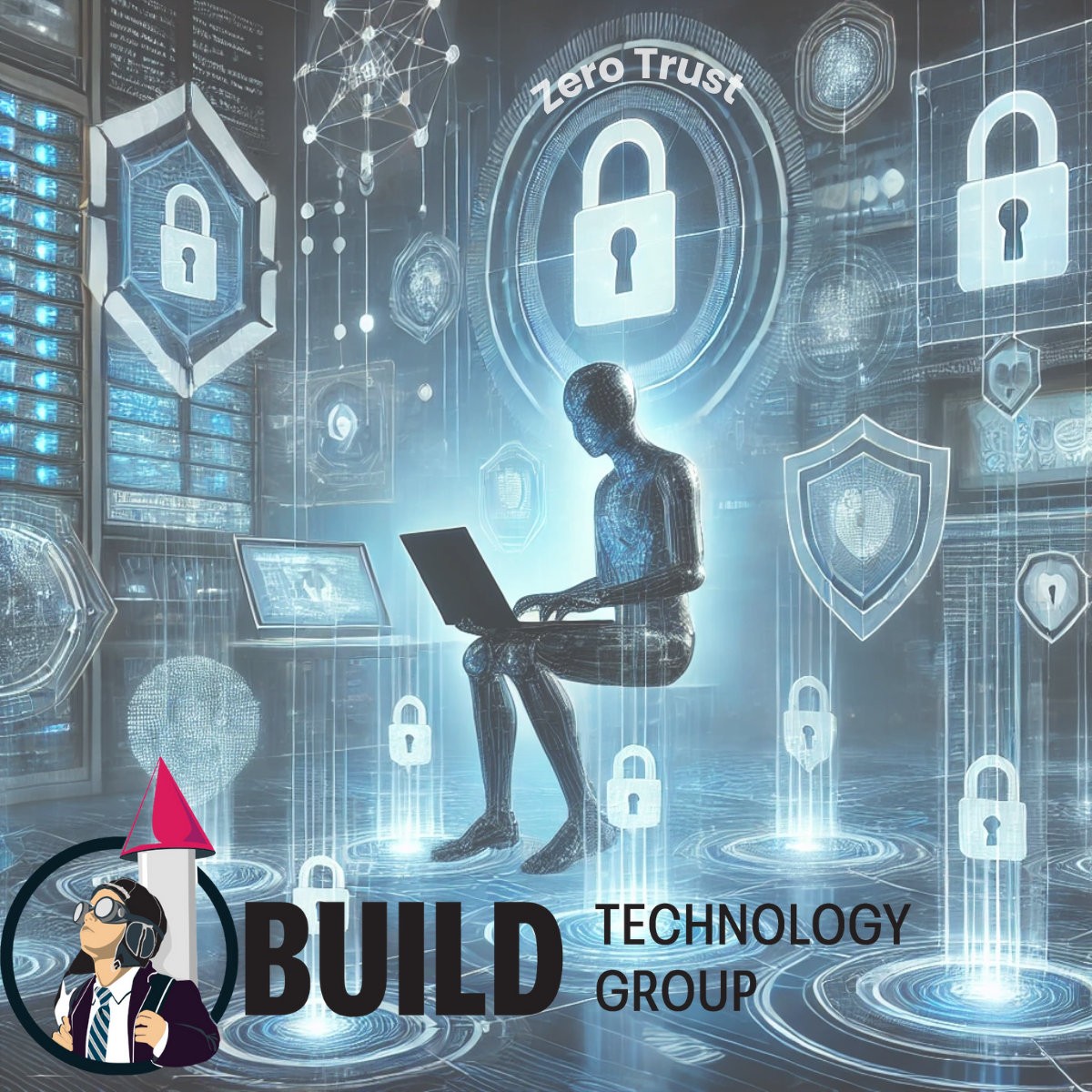
In today’s fast-paced tech world, delivering a product that meets user expectations isn’t just a goal—it’s a necessity. Quality Assurance (QA) testing forms the foundation of this pursuit, ensuring every element of a product is functional, intuitive, and secure. At Build Technology Group, we take pride in offering QA testing that goes beyond the basics to deliver exceptional results for both our clients and their end-users.
Quality Assurance isn’t about checking the box at the end of development—it’s about refining the process from start to finish. Unlike Quality Control (QC), which evaluates the final product for defects, QA testing ensures that the entire development cycle supports creating a robust and user-centric solution.
By identifying and resolving issues early, QA testing saves time, reduces costs, and enhances the overall user experience. It ensures products aren’t just functional—they’re efficient, intuitive, and secure.
At Build Technology Group, our approach to Quality Assurance combines cutting-edge tools, a user-centric focus, and seamless collaboration to deliver results you can trust. Here’s what makes our QA testing exceptional:
We combine the power of automated and manual testing techniques to identify and resolve issues quickly and accurately. This dual approach ensures high-performance products that meet and exceed client expectations. Our precision-driven testing guarantees that every feature works as intended, delivering a reliable product from the very first interaction.
Quality Assurance isn’t just about functionality; it’s about creating an experience. By testing from the user’s perspective, we ensure that products are intuitive and satisfying to use. From logical workflows to seamless navigation, our QA process enhances usability, resulting in a product that truly resonates with the end-user.
We don’t wait until the end to address issues. Our QA process integrates testing at every stage of development, identifying opportunities for improvement as they arise. This proactive approach keeps the development cycle adaptive and ensures that the final product is optimized for performance and reliability.
We believe in keeping our clients informed every step of the way. Our QA team works closely with developers and project managers to provide real-time insights, enabling quick adjustments and fostering a seamless workflow. Collaboration is at the heart of our Quality Assurance process, ensuring that all stakeholders are aligned toward a common goal.
In an environment where competition is fierce and user expectations are high, Quality Assurance provides the edge companies need to succeed. QA testing reduces the risk of costly errors, streamlines development, and builds trust with users by delivering products that perform as promised.
At Build Technology Group, our commitment to Quality Assurance means you can confidently move forward, knowing your product meets the highest standards of excellence.
Your product deserves more than just a final check. With Build Technology Group’s QA testing services, you’ll gain a partner dedicated to delivering quality at every step. From catching issues early to enhancing user experiences, we help you create products that stand out in the market.
Ready to elevate your product? Let’s connect and build something extraordinary together.?
Meet with the BUILD team today! BUILD WITH US – Your Software and Managed Solution Partner – Build Technology Group
Follow BUILD on LinkedIn: Build Technology Group-Follow Us!


In today’s digital world, phishing attacks are evolving quickly and pose a serious threat to businesses of all sizes. These scams trick employees into sharing sensitive information like login credentials or financial details, which can lead to major security breaches. To combat this, businesses need to focus on cybersecurity awareness and put strong security measures in place. At Build Technology Group, we help organizations build a culture of vigilance and protection.
? Strong Passwords
Strong, unique passwords for every account are key to cybersecurity. Policies requiring a mix of uppercase and lowercase letters, numbers, and special characters reduce the chance of unauthorized access. Regular password updates and avoiding reuse across platforms are also crucial.
?️ Multi-Factor Authentication (MFA)
Adding Multi-Factor Authentication (MFA) strengthens security by requiring two or more verification steps, like a password and a one-time code. Even if login details are stolen, MFA can block unauthorized access.
? Email Filtering
Email is a common path for phishing scams. Using email filters helps catch and block malicious messages before they reach employees. This reduces the chances of successful phishing attacks.
? Software Updates
Keeping software and systems updated closes security gaps. Updates often fix vulnerabilities that attackers could exploit. Regular updates are a simple but powerful defense.
✅ DMARC Implementation
DMARC (Domain-Based Message Authentication, Reporting, and Conformance) verifies emails sent from your domain to prevent attackers from impersonating your organization. This helps reduce phishing scams and spoofing risks.
? Establish Clear Processes
A clear incident response plan is essential. Employees should know how to report phishing attempts, whom to contact, and what steps to take. Quick reporting can greatly reduce the impact of an attack.
? Monitor for Suspicious Activity
After an incident, monitor accounts and systems closely for unusual activity. Acting quickly can prevent further damage and secure your systems.
? Spear Phishing
Spear phishing targets specific individuals using personal information to make emails seem legitimate. These attacks are harder to spot and require extra vigilance from employees.
? Smishing
Phishing via text messages, or smishing, tricks users into revealing information or clicking malicious links. With more people relying on mobile devices, smishing is a growing threat.
☎️ Vishing
Vishing, or phone-based phishing, uses social engineering to extract sensitive information over the phone. Training employees to recognize and report suspicious calls is crucial.
? Business Email Compromise (BEC)
BEC targets executives to trick them into approving fraudulent payments or sharing sensitive data. This requires strict verification processes and heightened awareness across all levels.
By adopting these proactive security measures, businesses can greatly reduce their risk of falling victim to phishing attacks. At Build Technology Group, we’re committed to helping organizations boost their defenses and create a culture of cybersecurity awareness. Stay informed, stay vigilant, and together, let’s BUILD a safer digital world! ??
Connect with the BUILD Team today: BUILD WITH US – Your Software and Managed Solution Partner – Build Technology Group

In today’s data-driven world, organizations rely on vast amounts of information to make decisions, improve operations, and better serve customers. But with data coming from multiple sources in different formats, it’s essential to have a reliable process to manage, organize, and streamline that data. Enter ETL: Extract, Transform, and Load. This powerful process ensures that your data is accurate, consistent, and always accessible.
At Build Technology Group, we specialize in ETL services that make data management simpler and more efficient, helping you unlock the full potential of your data. ?️?
ETL stands for Extract, Transform, and Load—a process that gathers data from various sources, changes it into a usable format, and loads it into a destination like a database or data warehouse. This enables businesses to consolidate and organize their data, making it easier to generate reports, conduct analyses, and share information with clients or vendors. ??
Whether you’re gathering data for reporting, analytics, or file sharing, ETL is the backbone of effective data management. It ensures that your data is:
✅ Accurate: ETL processes validate data, reducing errors.
? Consistent: By standardizing data from multiple sources, ETL eliminates discrepancies.
? Accessible: With data organized in one place, retrieval becomes faster and more efficient.
An ETL developer is crucial for designing, implementing, and maintaining ETL workflows. Here are some key ways an ETL developer can benefit your organization:
Data integration is the foundation of ETL. An ETL developer brings together data from various sources—internal systems, third-party sources, or external databases—into one centralized location. This provides a unified view, which eliminates silos that often hinder productivity and accuracy. ??
Our ETL experts design and manage these workflows, making sure data from different sources flows seamlessly into a single, organized database. This central data is easier to analyze, manage, and access, making it a valuable asset.
Efficient data storage is as important as the data itself. ETL developers assess your company’s data storage needs, removing the guesswork around space requirements. By optimizing storage, they help you reduce costs while maintaining easy access to essential information.
Data quality is essential to make informed decisions. Our ETL developers ensure that only accurate and standardized data reaches production, creating consistency across your organization. This quality assurance step prevents errors and inconsistencies that could compromise analytics and reports. With reliable data, you can trust that reports and analyses reflect accurate, up-to-date information. ✅
ETL processes allow for data collection from diverse sources like websites, CRM systems, and sales systems. By pulling data into one place, ETL simplifies integration from multiple systems, making it easier to interpret large volumes of information. ??
Instead of manually gathering data from separate sources, your team can focus on analysis and strategy, saving time and resources.
Organized, accurate data speeds up data requests, letting you make data-driven decisions faster. With a streamlined ETL process, data retrieval is quicker because it’s already cleaned and verified. This efficiency helps businesses operate more effectively and respond to changes quickly.
ETL developers don’t just create workflows; they monitor and troubleshoot data processes to keep your system running smoothly. By proactively identifying and addressing data discrepancies, performance bottlenecks, or data load failures, they prevent issues before they impact your operations. ?
At Build Technology Group, our team of ETL experts closely monitors data processes, ensuring efficient and reliable operations.
With a solid ETL process in place, your organization can operate confidently, knowing your data is accessible, accurate, and ready to support your goals. Whether you need data for reporting, insights, or internal analysis, ETL makes it possible to harness the power of information. ?✨
At Build Technology Group, we’re here to help you BUILD a data management system that enables faster, better-informed business decisions. Let’s work together to unlock the potential of your data with ETL. ?
Contact us today to start your journey toward seamless data management and analytics! ?BUILD WITH US – Your Software and Managed Solution Partner – Build Technology Group
Follow BUILD on LinkedIn: Build Technology Group- Follow Us!
The shift to remote and hybrid work environments has transformed the way we work, offering flexibility but also introducing new cybersecurity challenges. With employees accessing company data and systems from various locations and devices, securing these endpoints has become more crucial than ever. At Build Technology Group, we provide solutions to help your organization stay resilient and prepared, mitigating the risks that come with remote work.
To effectively safeguard your remote workforce, implementing a multi-layered security strategy is essential. Here are some key approaches that every organization should consider:
With remote work, employees access sensitive information from different locations and devices. Advanced endpoint protection goes beyond basic antivirus to include real-time threat detection and response capabilities. This includes antivirus and anti-malware tools that can detect and block threats before they become a problem, ensuring your devices and data remain secure.
Virtual Private Networks (VPNs) are essential for encrypting data traffic, making it more challenging for cybercriminals to intercept sensitive information. By setting up VPNs for your employees, you provide a secure communication channel, which is especially crucial when team members work from public or home networks that may lack robust security.
Adding an extra layer of security through multi-factor authentication (MFA) helps protect accounts and systems from unauthorized access. MFA requires users to verify their identities through additional factors beyond passwords—such as a code sent to their mobile device or biometric verification—making it significantly more difficult for attackers to gain access.
Software vulnerabilities are often the entry point for cyber threats. Regular patch management ensures that your organization’s systems are up to date, closing security gaps as soon as they’re identified. By proactively managing patches, you can reduce the risk of exploitation and improve the overall resilience of your IT environment.
Alongside these strategies, there are a few critical considerations that can significantly strengthen your endpoint security in a remote work setting:
Maintaining visibility into all remote devices used within your organization is crucial. By keeping an up-to-date inventory, you can monitor the security status of each device, ensure necessary updates are installed, and enforce security policies more effectively.
Role-based access control is a valuable tool for managing permissions and minimizing risk. By limiting access to sensitive data based on an employee’s role, you can reduce the potential for insider threats and unauthorized access, ensuring that users only access the information necessary for their job functions.
No security strategy is complete without a robust incident response plan. Having a plan in place allows your organization to react quickly to security breaches, reducing potential damage and recovery time. Make sure your response plan includes clear communication protocols, a predefined chain of command, and steps for containment and recovery.
As organizations adapt to remote and hybrid work environments, it’s essential to stay proactive in managing cybersecurity risks. Build Technology Group is here to help you build a tailored endpoint security strategy that protects your remote workforce and keeps your organization one step ahead of emerging cyber threats.
If you’re ready to strengthen your security strategy and prepare for the future of work, let’s BUILD a customized solution to keep your organization resilient and secure in today’s dynamic digital landscape.
Meet with the BUILD team today! BUILD WITH US – Your Software and Managed Solution Partner – Build Technology Group
Follow BUILD on LinkedIn: Build Technology Group- Follow Us!


As cyber threats grow more sophisticated, the traditional security perimeter—firewalls and defenses that protect a centralized network—is no longer sufficient. With remote work, cloud computing, and distributed teams now the norm, organizations need a more robust approach to cybersecurity. Enter Zero Trust: a transformative model designed to meet the needs of modern security.
Zero Trust is a security framework that operates on a fundamental principle: “Never trust, always verify.” In other words, it assumes that threats can come from inside or outside the network, requiring every access attempt to be verified continuously. Unlike traditional models that grant broad access once someone is authenticated, Zero Trust only provides access as necessary, reducing the potential impact of a breach.
At Build Technology Group, we specialize in implementing cybersecurity strategies tailored to organizations’ specific needs. Let’s explore the key benefits of Zero Trust and why it’s essential for today’s digital landscape.
One of the biggest advantages is that it significantly reduces the potential damage of a breach. Traditional security models often grant broad access once a user is authenticated, meaning a compromised account could give attackers access to a large part of the network. Zero Trust, on the other hand, limits each user’s permissions to only what’s necessary for their role.
For example, an employee in accounting wouldn’t need access to marketing data or engineering resources. By segmenting permissions, Zero Trust ensures that if an account is compromised, the impact is contained to the smallest possible area. This granular approach to access control minimizes the damage and the cost of a breach, providing an extra layer of protection against cyber threats.
In traditional security models, attackers who breach the perimeter can often move laterally through a network, gaining access to different areas and sensitive information. Zero Trust eliminates this risk by connecting users directly to authorized applications and resources without providing broad network access.
Imagine a castle with multiple doors and guards—each guard verifies a person’s identity and purpose before granting access. This is the approach ensuring users only have access to specific applications or files they need. Even if attackers gain access to a particular area, they can’t simply move through the network undetected. This containment strategy helps prevent data leaks, intellectual property theft, and other costly breaches.
As businesses increasingly rely on cloud services, microservices, and APIs (application programming interfaces), Zero Trust is essential to protect sensitive data within these environments. Microservices and APIs allow different parts of an application to communicate with each other, but they can also introduce vulnerabilities if left unprotected.
It applies strict access controls to these elements, ensuring that only authenticated and authorized users or systems can interact with specific services. By enforcing secure communication between microservices and APIs, it helps prevent unauthorized access to crucial functionalities, making it more difficult for attackers to exploit gaps in security.
The rise of remote work and cloud-based solutions has redefined the workplace, offering flexibility and scalability but also introducing new cybersecurity challenges. With employees accessing data from various devices and locations, traditional network boundaries have dissolved. In this environment, Zero Trust becomes a critical strategy for safeguarding sensitive data and maintaining robust security protocols.
It operates on the assumption that every user, device, or application could be a potential threat. Continuous verification, multi-factor authentication, and strict access control policies help ensure that only authorized users access critical resources. For organizations that handle large volumes of sensitive data, such as healthcare, finance, or government agencies, it is indispensable in maintaining data security.
At Build Technology Group, we understand that transitioning to a Zero Trust framework can be complex. Our experts guide you through each step, from assessing your current security infrastructure to designing a tailored Zero Trust strategy. We provide:
–Security Assessments: Identify gaps in your current infrastructure and evaluate risks.
–Zero Trust Architecture Design: Develop a custom framework that aligns with your business goals.
-Implementation & Integration: Seamlessly integrate Zero Trust practices with your existing systems.
–Continuous Support & Monitoring: Ensure your Zero Trust model remains effective with ongoing support.
The shift toward Zero Trust is more than a trend—it’s a necessary evolution in cybersecurity. By continuously verifying access, limiting permissions, and blocking lateral movement within networks, Zero Trust provides a robust defense against today’s sophisticated threats.
Ready to build Zero Trust into your cybersecurity strategy? Reach out to Build Technology Group to learn how we can help you safeguard your organization’s data, protect your assets, and stay one step ahead of evolving cyber threats.
Meet with the BUILD team today! BUILD WITH US – Your Software and Managed Solution Partner – Build Technology Group
Follow BUILD on LinkedIn: Build Technology Group- Follow Us!